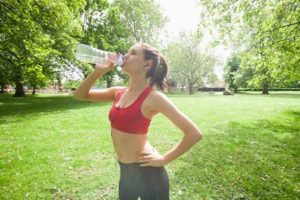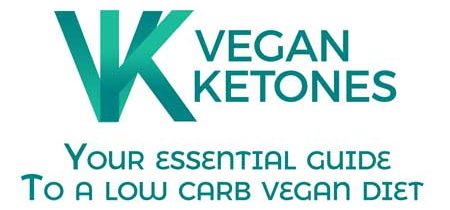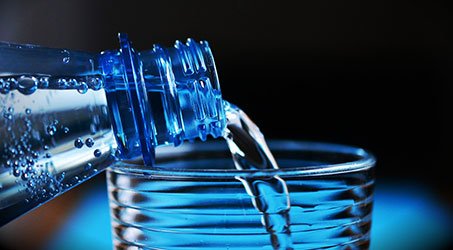Firstly, what are electrolytes and why are electrolytes on a keto diet so important.
- Electrolytes are salts which exist in nature in the form of minerals (ionic solution)
- Electrolytes are responsible for keeping the body properly hydrated so the muscles and nerves can function properly.
It’s important to take in adequate amounts of minerals as the body is mostly composed of water.
 Being well hydrated also helps to release harmful toxic waste from your body too (urea and ammonia).
Being well hydrated also helps to release harmful toxic waste from your body too (urea and ammonia).
Essential electrolytes are:
- Sodium – helps maintain fluid balance, needed for muscle contractions, and helps with nerve signaling
- Potassium – helps to keep blood pressure levels stable, regulates heart contractions, helps with muscle functions
- Bicarbonate – helps neutralize acids inside your body.
- Chloride – maintains fluid balance.
- Calcium – helps with muscle contractions, nerve signaling, blood clotting, cell division. Also, forming/maintaining bones and teeth.
- Phosphates – necessary for the formation of bone and teeth. It’s is also used as a building block for several important substances. Including those used by the cell for energy, cell membranes, and DNA .
- Magnesium – for muscle contractions, proper heart rhythms, nerve functioning, bone-building and strength. Reduces anxiety, digestion, and keeping a stable protein-fluid balance.
When you’re in a state of ketosis, your body doesn’t hold onto as much water. Electrolytes are “flushed out” of the body more easily.
Salting your food, then sodium isn’t a problem. The other minerals can be a different story on a vegan keto diet.
When we exercise and expend sweat the vital minerals are lost.
This needs to be replenished with water AND minerals. This is why you’ll often see athletes taking an electrolyte drink and a bit of banana (magnesium).
We hydrate more quickly if we combine drinking fluids with electrolytes.
Taking in electrolytes like sodium reduces the amount of water lost in urination. This means that fluids are more readily absorbed back into the muscles, tissue and nerves.
Keto flu and electrolytes
Ah yes, the dreaded keto flu, you’ve heard about it, maybe even suffered from it?
Managing electrolyte intake is important if you want to avoid the side effects typically associated with low carb dieting.
People often give up in their first week of a ketogenic diet because they think something is wrong when they get flu-like symptoms. This “flu” is just your body adapting to a different way of eating. Don’t forget, each cell is a living entity and undergoing a massive change!
I use Chronometer to track that I’m getting enough. In our getting started guide it explains the importance of tracking what you eat.
Symptoms of Electrolyte Imbalance resulting in “Keto Flu”
Electrolytes have so many different roles within the body. An imbalance normally causes noticeable changes in how you feel pretty quickly. Depending on the type of electrolyte imbalance you experience, a number of symptoms can occur including:
(NOTE – ALWAYS CONSULT A HEALTH PRACTITIONER IF YOU HAVE ANY OF THESE SYMPTOMS)
- Muscle aches, spasms, twitches and weakness
- Restlessness
- Anxiety
- Frequent headaches
- Feely very thirsty
- Insomnia
- Fever
- Heart palpitations or irregular heartbeats
- Digestive issues like cramps, constipation or diarrhea
- Confusion and trouble concentrating
- Bone disorders
- Joint pain
- Blood pressure changes
- Changes in appetite or body weight
- Fatigue (including chronic fatigue syndrome)
- Numbness and pain in joints
- Dizziness, especially when standing up suddenly
(Taken from Dr Axe)
Counteracting the effects of keto flu is easy, just keep replenishing your electrolytes. Make sure you include foods rich in electrolytes in your everyday diet and take food supplements (if needed).
So, we’ve covered the “WHAT” and the “WHY” of electrolytes on a keto diet, let’s get to the “HOW”
These are 2 mineral supplements I use:
- Solgar Magnesium, Calcium and Zinc If I don’t take magnesium I get terrible cramps in my legs and feet!
- In the UK, I use Linden’s Potassium but there are plenty of vegan potassium supplements available in the US (watch out for gelatin capsules).
I also use a tip I found over on another health site
“Putting a pinch of Himalayan salt and a teaspoon or so of organic raw apple cider vinegar in your purified water will replenish electrolytes rapidly.”
Most nuts and seeds are very high in electrolytes.
On a vegan keto diet we eat plenty of these, well at least I do!
- Almonds
- Walnuts
- Sesame seeds
- Sunflower seeds
- Peanuts
- Hazelnuts
- Pumpkin seeds
- Cashews (a bit high carb so in moderation)
- Macadamias
Dark Leafy Greens
Eat plenty, low carb AND nutritious! Spinach, in particular, is high in minerals as well as:
- kale
- beet greens
- mustard greens
- bok choy
- chard
All these greens have sodium, calcium, potassium, magnesium, AND “prebiotics” that help your good gut flora and digestion.
You can also use Lo Salt as a source of potassium
Because beans are high carb and to be avoided, I haven’t added to this list, although they are a good source of minerals.
I’ve tried to keep things simple and easy to follow in this article about electrolytes on a keto diet, for practical purposes. To read a more in-depth report, science-based here is a good resource: https://www.ncbi.nlm.nih.gov/books/NBK234935/


I am left more confused by this article – So if you can “quickly replenish electrolytes” using s pinch of himalayan salt and apple cider vinegar in water, plus the fact that we eat lots of nuts and greens on vegan keto, why the need for over the counter supplementation? (it’s mentioned what you use but I’m not understanding why?) Thank you!
I’ve added a little to the post to make it clearer, thanks for pointing that out. 🙂